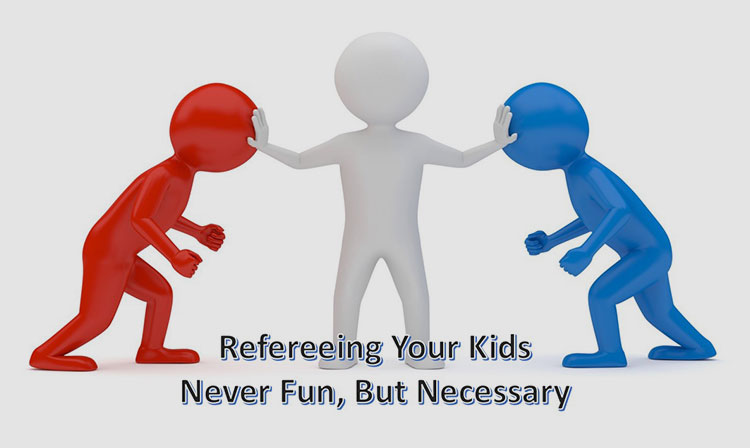Family conflict is real. It is as old as the scriptures. No one enjoys conflict. It brings stress, tension, and can eat away at relationships. It can also be an opportunity to learn how to better relate to family members. In any family, there will always be arguments. That is what makes them normal. Blood is thicker than mud and these petty arguments can be fixed with parents serving as the referees. Nevertheless, here is a good question: how exactly do you handle conflicts between children?
Here’s a tip. Advise your children to approach the conflict with their sibling(s) in a positive manner. It could be a simple misunderstanding that can be easily remedied. There is no need for kicking or screaming.
Everything starts at home. If there is fighting in your household, your children will have the tendency to bring an ill temper to classroom and especially to the playground at school during recess. Parents should begin disciplining (i.e. teaching and mentoring) their children at a young age regarding the handling of conflict. Take a look below at some approaches to consider:
1. Mediating is good. By discussing what the problem is exactly, there will be a clearer understanding on why the argument ensued in the first place. Teach kids that they can always communicate with their sibling(s) in a mild manner. No need to raise voices. Parents must teach their children how to discuss their opinions with one another and come up with common solutions.
2. Set some ground rules. This should be discussed when emotions are not clouding their judgment. Discuss the basic rules: no hitting, no kicking, and no pulling of hair, no yelling and no name-calling. (Yes…sometimes conflicts can become physical. This is normal. What is not normal is for it to go unchecked for an extended period.)
3. Set some consequences. It is important for children to feel the pain of a consequence when they fail to fix an argument. Some parents term it as punishment but, for a positive light, tell them that this is the consequence of their wrong actions. You can separate them for some period or you could ground them both. If you really want to hurt them deeply, take away their electronics for an extended period. This has proven to be more painful to some kids than an actual form of corporal punishment.
4. Talk to them. Have a sit-down discussion about what they are feeling and what they are thinking. It is vital that children feel that they can always come to their parents. They will be more apt to feel this way if you as their parents are more open to and with them.
5. Children must be aware. Children need to know that a conflict will arise way before it actually shows itself. By becoming more sensitive with their surroundings, children can prevent graver situations from occurring, thus fending off a potential argument. For example, if a child knows that a certain action will lead to his sibling getting angry, he must be pull back from doing it. The parent must increase their kids’ awareness of potential conflicts and sensitivity when it comes to understanding different points of view.
6. Maturing into conflict resolution. Normally, the parents come up with the judgment and have the final say whenever children argue. However, at a certain age, like years 11 to 14, the children must be able to do it themselves. This will prepare them for the more significant conflicts that await them in high school and beyond.
Now that we have discussed tips pertinent to refereeing your children, parents should take heed of the following:
1. Never compare children. This can cause jealousy between or among them. Each child is special in his/her own way. Acknowledge their differences. Each brings strengths and weaknesses to any situation. One’s strength can complement another’s weakness.
2. Teach them respect among one another. Praise your kids whenever they are courteous and polite, especially when they help each other out.
3. Be the example. Serve as your children’s example when it comes to solving problems. By watching you and listening to how you discuss the problem, then they will eventually learn how you do it and they will do it themselves. They will catch more from what you do than from what you say.
4. Identify conflict patterns. Try to determine a pattern to why conflicts take place. Does this happen when your children are bored or when they spend too much time together? Take note of the context of the conflicts.
Sibling rivalry is normal and, for the most part, unavoidable. It will take place eventually. The key is handling it with care when it occurs.
Remember this: the ultimate sibling rivalry was Cain and Abel in the book of Genesis. Jealousy and pride were at the root of this conflict, which ended horribly. Work hard to embed within your children the unconditional love and humility that they will need as they navigate their lives. No better place than to start than with their own brothers and sisters.








